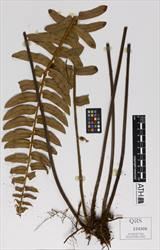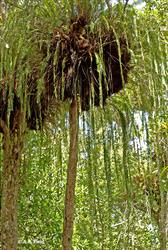Nephrolepidaceae
Australian Tropical Ferns and Lycophytes - Online edition
Nephrolepis acutifolia



Nephrolepis acutifolia (Desv.) Christ
Link to Australian Plant Name Index for publication details and synonyms: https://id.biodiversity.org.au/name/apni/81960
Sword Fern or Fishbone Fern
Stolons and basal portions of stipes densely covered with lanceolate rusty-brown scales; scales sometimes with marginal cilia. Fronds to 1.7 m long, when young with a woolly indumentum of pale scales, each consisting of a small rounded base with 1 longer and several shorter hair-like processes. Pinnae coriaceous with prominent white hydathodes in a marginal row, sometimes with a blunt basal auricle; margins entire or slightly undulate. Sterile pinnae 10–60 mm long, 10–14 mm wide; apex rounded. Fertile pinnae to 80 mm long; apex acute. Sori marginal, linear, continuous or interrupted; indusium attached along the inner side.
Occurs in NE QLD from Iron Range to Cape Capricorn, usually at low altitudes, NT and N WA. Also scattered across the Palaeotropics.
Epiphytic, lithophytic or occasionally terrestrial in rainforest. This species commonly inhabits Drynaria and Platycerium clumps with large specimens observed in palm swamp, mangroves and riparian rainforest at low altitudes.
An attractive ornamental fern.
Readily cultivated in a hanging container or a nest-epiphyte in tropical gardens. Slower to establish than other Nephrolepis.
Nephrolepis acutifolia can be distinguished from all other Australian Nephrolepis by the entire margins of pinnae with linear sori.
Key to Australian Nephrolepis spp.:
1a. Sori linear with a linear indusium and borne on margin; pinnae with entire margins = Nephrolepis acutifolia
1b. Sori round or kidney-shaped with a kidney-shaped indusium and borne supramedially to medially, each on the end of a vein, margins ~ crenate = 2
2a. Pinnae with an obtuse apex, less than 50 mm long = 3
2b. Pinnae with an acute to attenuate apex, greater than 50 mm long = 4
3a. Rachis with scales, rarely hairy, basal auricles of pinnae overlapping rachis = Nephrolepis cordifolia
3b. Rachis with hairs, rarely scaley, basal auricles of pinnae not usually overlapping rachis = Nephrolepis arida
4a. Pinnae with an acroscopic basal auricle; all parts hirsute = 5
4b. Pinnae lacking a distinct acroscopic basal auricle, indumentum sparse = 5
5a. Hairs on upper side of costae absent; rachis scales rufous, with strongly dentate acumen; sori submarginal = Nephrolepis hirsutula
5b. Hairs on upper side of costa present; rachis scales hyaline or light brown (rarely rufous), with nearly entire acumen; sori submedial = Nephrolepis brownii
6a. Sori borne close to margin, stolons densely scaly = Nephrolepis biserrata
6b Sori borne medially, stolons green with few scales = Nephrolepis obliterata
Field AR, Quinn CJ, Zich FA (2022) Australian Tropical Ferns and Lycophytes. apps.lucidcentral.org/fern/text/intro/index.htm (accessed online INSERT DATE).
Field AR, Quinn CJ, Zich FA (2022) ‘Platycerium superbum’, in Australian Tropical Ferns and Lycophytes. apps.lucidcentral.org/fern/text/entities/platycerium_superbum.htm (accessed online INSERT DATE).







